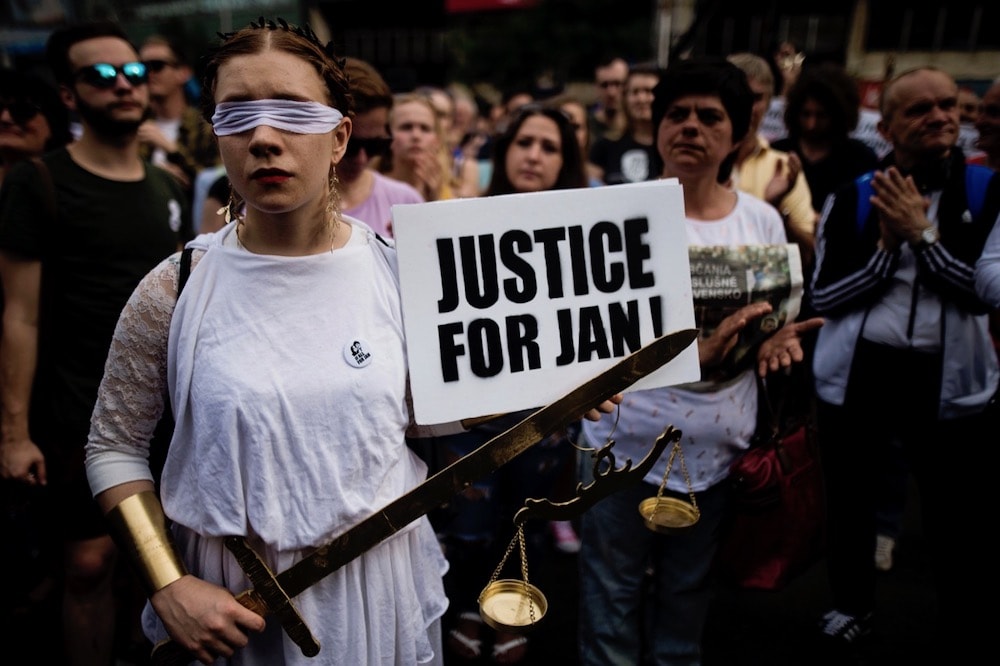The Council of Europe Platform for the Protection of Journalism has recorded 26 impunity alerts involving 40 journalists: 14 in Kosovo, 6 in Russia, 6 in Ukraine, 6 in Turkey, 2 in Azerbaijan, 1 in Malta, 1 in the UK, 1 in Cyprus, 1 in Slovakia, 1 in Serbia, and 1 in Montenegro.
This statement was originally published on europeanjournalists.org on 2 November 2022.
Today is the UN International Day to End Impunity for Crimes against Journalists, #EndImpunity. The European Federation of Journalists (EFJ) joined the International Federation of Journalists (IFJ) to demand governments put an end to impunity and to highlight and denounce crimes targeting journalists that remain unpunished while the masterminds walk free.
On this day, the EFJ reminds all that all those who commit crimes against journalists must face justice, as such unpunished crimes have a strong chilling effect on media freedom.
The Council of Europe Platform for the Protection of Journalism has recorded 26 impunity alerts involving 40 journalists: 14 in Kosovo, 6 in Russia, 6 in Ukraine, 6 in Turkey, 2 in Azerbaijan, 1 in Malta, 1 in the UK, 1 in Cyprus, 1 in Slovakia, 1 in Serbia, and 1 in Montenegro.
“It is a terrifying number,” said EFJ President Maja Sever. “The relatives of 40 journalists murdered or missing in Europe are still waiting for justice. And this number does not take into account the 21 journalists who have been killed in Europe since 2020 and who are not yet considered as cases of impunity. This is a shocking fact. We once again call on the judicial and political authorities to do everything possible to combat the impunity that gives free rein to the killers of journalists.”
Here is the list of 40 killed or missing journalists in Europe who are waiting for justice:
- Jamal Khashoggi (2018, Turkey)
- Ján Kuciak (2018, Slovakia)
- Daphne Caruana Galizia (2017, Malta)
- Saaed Karimian (2017, Turkey)
- Rohat Aktaş (2016, Turkey)
- Pavel Sheremet (2016, Ukraine)
- Naji Jerf (2015, Turkey)
- Andrea Rocchelli (2014, Ukraine)
- Andrei Mironov (2014, Ukraine)
- Oleksandr Kuchynsk (2014, Ukraine)
- Timur Kuashev (2014, Russia)
- Akhmednabi Akmednabiyev (2014, Russia)
- Viacheslav Veremii (2014, Ukraine)
- Mikhail Beketov (2013, Russia)
- Nikolai Potapov (2013, Russia)
- Rafiq Tagi (2011, Azerbaijan)
- Gadzhimurad Kamalov (2011, Russia)
- Hrant Dink (2007, Turkey)
- Anna Politkovskaïa (2006, Russia)
- Elmar Huseynov (2005, Azerbaijan)
- Bardhyl Ajeti (2005, Kosovo)
- Dusko Jovanovic (2004, Montenegro)
- Martin O’Hagan (2001, UK)
- Bekim Kastrati (2001, Kosovo)
- Georgiy Gongadze (2000, Ukraine)
- Marjan Melonaši (2000, Kosovo)
- Shefki Popova (2000, Kosovo)
- Xhemajl Mustafa (2000, Kosovo)
- Enver Maluku (1999, Kosovo)
- Ljubomir Knežević (1999, Kosovo)
- Milo Buljević (1999, Kosovo)
- Aleksandar Simović (1999, Kosovo)
- Krist Gegaj (1999, Kosovo)
- Momir Stokuća (1999, Kosovo)
- Đuro Slavuj (1998, Kosovo)
- Ranko Perenić (1998, Kosovo)
- Afrim Maliqi (1998, Kosovo)
- Kutlu Adalı (1996, Cyprus)
- Dada Vujasinovic (1994, Serbia)
- Uğur Mumcu (1993, Turkey)
On this day, the EFJ joins the IFJ in welcoming the mobilisation of their affiliates against impunity in Europe.
Spain. The Madrid Press Association (APM) today inaugurated a space in its headquarters that will serve as a tribute to the Spanish journalists murdered in the exercise of their profession. A photo of each journalist will be displayed.
Serbia. On 2 November, the Independent Journalists’ Association of Serbia (IJAS-NUNS) published a video about the state of impunity in the Western Balkans. The EFJ-IFJ affiliates in the region (BHJA, CJA, AGK, AJM, IJAS-NUNS and TUMM) are signing the IFJ Convention and publishing a joint statement.
Switzerland. Syndicom will support the IFJ convention on the safety of journalists and spread the IFJ call.
UK and Ireland. On 2 November, the NUJ will host a webinar to mark the International Day to End Impunity for Crimes against Journalists. The union will launch a short safety film featuring members sharing testimony about abuse, harassment and intimidation. The NUJ will also highlight a new mobile safety toolkit to help journalists protect themselves and their sources and technological ways to secure communications. The toolkit covers physical safety, information security, mental health care, health and safety at work and gives advice on how to take action against abuse on social media platforms.
